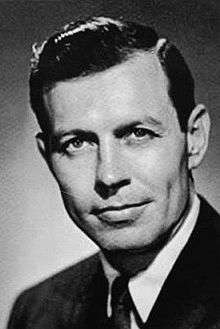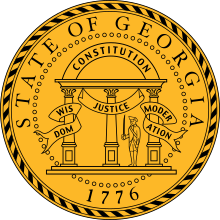Carl Sanders
Carl Edward Sanders Sr. (May 15, 1925 – November 16, 2014) was an American attorney and politician who served as the 74th Governor of the state of Georgia from 1963 to 1967.
Carl Sanders | |
|---|---|
 | |
| 74th Governor of Georgia | |
| In office January 15, 1963 – January 11, 1967 | |
| Lieutenant | Peter Geer |
| Preceded by | Ernest Vandiver |
| Succeeded by | Lester Maddox |
| Member of the Georgia House of Representatives | |
| In office 1954-1956 | |
| Member of the Georgia Senate | |
| In office 1956-1962 | |
| Personal details | |
| Born | Carl Edward Sanders May 15, 1925 Augusta, Georgia |
| Died | November 16, 2014 (aged 89) Atlanta, Georgia, U.S. |
| Resting place | Westover Memorial Park, Augusta, Georgia |
| Political party | Democratic |
| Spouse(s) | Betty Bird Foy |
| Alma mater | University of Georgia |
| Military service | |
| Allegiance | |
| Branch/service | United States Army |
| Years of service | 1943–1945 |
| Unit | U.S. Army Air Corps |
| Battles/wars | World War II |
Early life and education
Sanders was born in Augusta in Richmond County in eastern Georgia, and attended the University of Georgia at Athens on a football scholarship. A backup, left-handed quarterback, Sanders received little playing time, which prompted coach Wally Butts to recount years later, "Carl, if I had known you were going to be governor, I'd have played you more." He was a member of the Chi Phi fraternity, Order of the Greek Horsemen, Gridiron Secret Society and the Phi Kappa Literary Society. He left to fight in World War II, enlisting in the United States Army Air Corps in 1943 and became a B-17 Flying Fortress bomber pilot. After the war, he returned to complete his bachelor's and law degrees at the University of Georgia.
Career
In 1954, Sanders won a seat in the Georgia House of Representatives. In 1956, he was elected to the Georgia Senate and served two years as president pro tempore of the chamber.
In the 1962 Democratic gubernatorial primary, Sanders defeated former Governor Marvin Griffin. Sanders received 494,978 votes (58.7 percent) to Griffin's 332,746 (39 percent).[1] Thereafter, Griffin largely retired from politics. Sanders was the first Georgia governor from an urban area since the 1920s. He was the first modern Georgia governor nominated in the Democratic primary by the popular vote after the abolition of the County Unit System, a kind of electoral college formerly used to elect Georgia governors. When Mr. Sanders became governor in 1963 - age 37, he was the youngest in the nation at the time. [2]
As governor, Sanders worked to improve education and the environment and led the transition toward racial desegregation, cooperating with U.S. Presidents John F. Kennedy and Lyndon B. Johnson on complying with civil rights laws.
Under the term limit law then in effect, Sanders was ineligible to run for re-election in 1966. In the general election campaign that year, he endorsed Democratic nominee Lester Maddox, a segregationist, as his successor though the two had disagreed on many issues. At the Democratic State Convention in Macon on October 15, 1966, Sanders told the delegates: "A man should be loyal to his country, his family, to his God and to his political party -- and don't you ever forget it."[3]
In his speech, Sanders likened Maddox's Republican opponent, U.S. Representative Howard Callaway, to the "arrogance of Richard Nixon, the chameleon ability of Ronald Reagan to switch rather than fight, and the callous concern for human needs that is a throwback to McKinley, Harding, and Coolidge."[4] The Marietta Daily Journal said that Sanders in supporting Maddox had glorified party at the expense of statecraft.[5] Callaway criticized Sanders for mishandling the state budget surplus, a position which weakened the Republican among anti-Maddox moderate voters.[6] Callaway led Maddox in the popular vote but failed to win a majority, and the Democratic-controlled Georgia General Assembly chose Maddox as governor.
Sanders left office at the peak of his popularity and turned down several offers for federal government positions from President Johnson. Instead he returned to mount an unsuccessful campaign for governor in 1970 against future U.S. President Jimmy Carter. According to Atlanta Constitution political reporter Bill Shipp, Carter employed race-baiting tactics to defeat Sanders in the Democratic primary.[7][8][9] Fifty-three newspapers throughout the state endorsed Sanders and only one major daily (the Columbus Enquirer) backed Carter.[10] Carter's campaign criticized Sanders for paying tribute to Martin Luther King Jr. and distributed grainy photographs of Sanders arm-in-arm with two black men. At the time, Sanders was part-owner of the Atlanta Hawks, and the two black men were Hawks players celebrating after a victory.[11] Carter won both the gubernatorial primary and the general election (Maddox, ineligible to run for re-election as governor in 1970, successfully ran for lieutenant governor that year).
Later life and death
After the loss in the primary to Carter, Sanders left electoral politics to concentrate on the practice of law. He served as chairman of the law firm of Troutman Sanders LLP for thirty years, and in 2007 became the firm's chairman emeritus. He died in Atlanta on November 16, 2014 at the age of 89, after a fall at his home.[12][13]
In recognition of his role in encouraging the construction and expansion of airports in Georgia, he was inducted into the Georgia Aviation Hall of Fame in 1997.[14]
References
- Congressional Quarterly's Guide to U.S. Elections, p. 1677
- Yardley, William (November 18, 2014). "Carl Sanders, 89, Dies; Led Georgia in '60s" – via NYTimes.com.
- Billy Hathorn, "The Frustration of Opportunity: Georgia Republicans and the Election of 1966", Atlanta History: A Journal of Georgia and the South, XXXI (1987-1988), p. 42
- Atlanta History, p. 42
- Marietta Daily Journal, October 4, 1966
- Atlanta History, p. 42
- Torpy, Bill (November 19, 2014). "The political grudge Carl Sanders takes to his grave". The Atlanta Journal-Constitution. Retrieved March 22, 2019.
- Sanders, Randy (1992). ""The Sad Duty of Politics": Jimmy Carter and the Issue of Race in His 1970 Gubernatorial Campaign". The Georgia Historical Quarterly. 76 (3): 612–638. ISSN 0016-8297. JSTOR 40582593.
- Sanders, Randy (2007). Mighty Peculiar Elections: The New South Gubernatorial Campaigns of 1970 and the Changing Politics of Race. Baton Rouge: Louisiana State University Press. ISBN 9780807132906. OCLC 153582828.
- http://www.newsmax.com/t/newsmax/article/608221
- David Freddoso, "Jimmy Carter's racist campaign of 1970" Washington Examiner, September 16, 2009
- "|". Archived from the original on November 29, 2014. Retrieved November 17, 2014.
- Yardley, William (November 18, 2014). "Carl Sanders, 89, Dies; Led Georgia in '60s" – via NYTimes.com.
- "Carl E. Sanders". Georgia Aviation Hall of Fame. Archived from the original on June 2, 2017. Retrieved October 9, 2018.
External links
| Party political offices | ||
|---|---|---|
| Preceded by Ernest Vandiver |
Democratic nominee for Governor of Georgia 1962, 1966 |
Succeeded by Lester Maddox |
| Political offices | ||
| Preceded by Ernest Vandiver |
Governor of Georgia 1963–1967 |
Succeeded by Lester Maddox |
